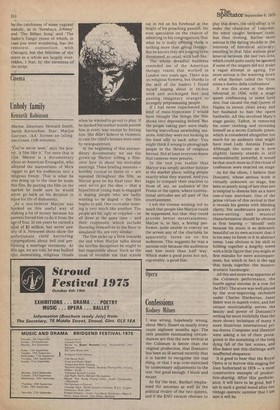Theatre
Teutonic plague
Kenneth Hurren
Happy End, music by Kurt Weill, book by Dorothy Lane, lyrics by Bertolt Brecht; English version by Michael Feingold (Lyric Theatre).
There are doubtless a few inncicents who, misled by the billing, will approach Happy End believing that the late Bertolt Brecht. the well-known Teutonic plague, was responsible only for the lyrics — a field of endeavour in which his work, if not exactly in the Cole Porter or Lorenz Hart league, is more or less tolerable to a literate public. In the interests of fair trading, then, not to mention the protection of the consumer, it should be instatnly remarked that there never was any such lady as 'Dorothy Lane', who is credited with the book, and that the general view is that Brecht wrote that too.
In support of this theory there is the clumping obviousness of its parable about the relationship between capitalism and Salvationism in Chicago in the 'twenties (a theme which Brecht developed in a subseqent disaster called St Joan of the Stockyards), as well as what might be identified as the Brechtian 'message' of the piece, which is delivered towards the end by a lady gangster known as The Fly', who avers that robbing a bank is far less reprehensible than owning a bank. This is an entertaining whimsy that may not strike anyone as an altogether cogent analysis of the imperfections of a capitalist society, although there are those whO will see it as the most sensible statement in the show, and the terrible thing is that they are very probably right.
The present adapter, Michael Feingold ("the American dramatist", I read in the programme), may have tried to minimise the ludicrous political content of the work, but there is, in truth, not much to choose in point of inanity between the philosophy and the plot, or between either and the characterisation. The recognisable talents of Angela Richards and Bob Hoskins, who play a Salvation Army girl and an ape-like gangstdr involved in a romance considerably more unlikely than the one in Guys and Dolls, survive in some measure the foolishness of their assignments; the performances of their confederates range from the desperately game to the laughably inadequate.
The melancholy occasion is occasionally cheered by the Kurt Weill music, when the ear is taken by, the catchiness of some vagrant melody, as in 'Surabaya Johnny' and 'The Bilbao Song' and 'The Sailor's Tango' (none of which, in case you were wondering, has the remotest connection with Chicago), but the felicities of the saore as a whole are largely overridden, I fear, by the torments of the script.
1/4.1



































 Previous page
Previous page